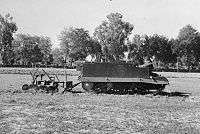Military College of Engineering (Pakistan)
| Type | Military |
|---|---|
| Established | 1948 |
| Principal | Major General Ajmal |
Academic staff | around 50 |
| Students | 500-700 |
| Location | Risalpur, Khyber-Pakhtunkhwa, Pakistan |
| Affiliations |
Higher Education Commission Pakistan Engineering Council |
| Website | Military College of Engineering Official Website |
Military College of Engineering is located at Risalpur, in Nowshera District, Khyber-Pakhtunkhwa, Pakistan. Military College of Engineering was established by the Pakistan Army. It a campus of NUST and one of the institutes of Civil Engineering of Pakistan.
About the college
Military College of Engineering, Risalpur, is one of Pakistan's civil engineering institutes, and is one of many educational institutes that come under the umbrella of National University of Sciences and Technology (NUST). Its students, upon graduation,serve in Pakistan Army Engineering Core also many civilian students are hired by some of the construction and engineering firms in Pakistan and the world.College offers both Undergraduate and Post Graduate Courses.
History


Military College of Engineering is a well-renowned institute in the field of civil engineering, with a rich history spanning over a half century. A year after the Independence of Pakistan, the School of Military Engineering (SME) was established at Sialkot in 1948. Having functioned at Sialkot for over four years, SME was shifted to Risalpur in 1952. Here it grew and expanded its sphere of activity beyond the combat related training and started with dispensation of civil engineering knowledge through regular Bachelor of Engineering classes. It gradually transformed into a full-fledged and matured engineering college and was named College of Military Engineering (CME). In 1958, the institution was renamed as Military College of Engineering (MCE). In 1962 it was given the charter of self degree awarding and autonomous institution status by government of Pakistan. In 1988 it was affiliated in with University of Engineering and Technology, Lahore for post-graduate studies. MCE also sought collaboration with well reputed Michigan State University of the United States of America. Scores of graduates have attained their higher education degrees from reputed universities in the United States and United Kingdom After establishment of National University of Sciences and technology, NUST in 1995. Military College of Engineering became one of its constituents college and moving forward by leaps and bounds.[1]
Location
The college is located in Risalpur, in the Khyber-Pakhtunkhwa province of Pakistan, and is located right next to Pakistan Air Force Academy.
Faculty
The faculty has both civilian and military members. They include professors who are graduates of Michigan State University and University of Illinois at Urbana Champaign in the field of civil engineering and who have also gone through various command and staff courses from Command and Staff College Quetta and National Defense University, Islamabad.
Education System
- Grade Point Average System (Relative) The college, like all constituent colleges of NUST, follows the US semester system, in which a GPA of 2.00 or more is required to become eligible for the award of degree. Recent Changes to Grading policy has been applied fully to civilian students, but the criteria of Military students is partially based on previous policy. to the students, detail is as below. A student has 7 years to complete and clear his all subjects. The system is a relative grading system. Every student must secure a minimum of D grade to pass a subject, while on average B/C+ is awarded. Grades are on discretion of Instructors and Grades are assigned a point value (A=4, B+=3.5, B=3.0, C+=2.5, C=2.0, D+=1.5, D=1.0, F=0.0).
- Outcome-Based Education System (Absolute) Outcome-based education (OBE) is an educational theory that bases each part of an educational system around goals (outcomes). By the end of the educational experience, each student should have achieved the goal. There is no single specified style of teaching or assessment in OBE; instead, classes, opportunities, and assessments should all help students achieve the specified outcomes. The role of the faculty adapts into instructor, trainer, facilitator, and/or mentor based on the outcomes targeted. In 2010, Pakistan became a provisional member of the prestigious Washington Accord and, since then, Universities are working to implement OBE. By the end of June 2016, a total of seven universities in Pakistan had fully adopted OBE system of education at undergraduate, graduate and doctoral levels, MCE being the first Pakistani college/university to implement this system. MCE is also the world's first college/university to develop and use a Microsoft C# aided sophisticated software to digitize this system rather to use older methods (like Excel and Matlab).
Student categories
- NS (NUST Students/Nustians) Civilian students selected through the NUST entrance test, join the university as NCs, they undergo military training for the 1st half of their 1st semester. NUST Students are provided with appointments i.e. Corporals (3rd Year/Junior) and SU (Last Year/Senior) to groom the Freshman.
- PC (Paying Cadets) Students whose parents were or still are members of Pakistan Army, can join the college on the seats of their parents if they are unable to pass the NUST entrance test. Their tuition fees is waived. They are required to undergo military training after the completion of their degrees and will join Pakistan Army (Engr.corps) for three years.
- ASC (Additional Selected Cadets) Student who are also sons of Army personnel, join this college on the seats of their parents if they are unable to pass the NUST entrance test. But they have to pay full NUST tuition fees, and they must join Army later.
- TC (Technical Cadets) Students who are enrolled in Pakistan Army. They enter the college after qualifying the ISSB armed forces selection test. Upon graduation from the college, the students acquire one-year training at the Pakistan Military Academy, to receive officer ranks (captain in Pakistan Army). TCs get paid by army and are not required to pay any kind of tuition or accommodation fee, and undergo strict military training.
- Officers (usually captain rank) These students who get selected first in Pakistan Military Academy they complete their 2 years training there and then those who selected Engineers Corps, they join MCE for civil engineering and later serve in the Engineer Corps also many army students pursue higher education in reputable foreign universities and are selected as military instructors in the Military College of Engineering.
MES School
MES school is an establishment and training centre of E-in-C Branch GHQ for the professional training and development of Military Engineering Service (MES) officers. It is also located at Military College of Engineering (MCE) and Commandant MCE is an administrative head of this Officer training school.
Combat Engineering Wing
Combat Engineering Wings of Military College of Engineering train Military Personnel so they can perform a variety of construction and demolition tasks under combat conditions. Such tasks typically include constructing and breaching trenches, tank traps and other fortifications, bunker construction, bridge and road construction or destruction, laying or clearing land mines, and other physical work in the battlefield. More generally, the combat engineer's goals involve facilitating movement and support of friendly forces while impeding that of the enemy.
Disaster Management and EOD Wing
Disaster Management and EOD Wing train the Security personnel as explosive ordnance disposal (EOD) technicians, who are specially trained to deal with the construction, deployment, disarmament, and disposal of explosive munitions and may include other types of ordnance such as nuclear, biological and chemical weapons along with improvised explosive devices (IED). Disaster management branch deals with the mitigation and management of Disasters that may include floods, earthquakes, landslides etc.